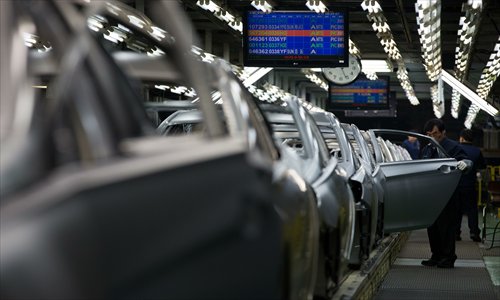HOME >> SOURCE
Carmakers resuming production; important step toward industrial normalization amid epidemic
By Yin Yeping Source:Global Times Published: 2020/2/12 18:23:47

Employees assemble vehicles on the production line at an auto factory in Asan, South Korea. Trade surplus in South Korea’s auto industry hit a new record in 2013 due to enhanced branding and improved product competitiveness, a government report showed Wednesday. The auto sector’s trade surplus reached $63.5 billion in January, the largest in the country’s history, according to the Ministry of Trade, Industry and Energy. The industry has maintained its surplus trend for 30 straight years. Photo: CFP
After days of layoffs, the auto industry which has been hard hit by the Covid-2019 outbreak is now returning to normal as factories have resumed operation following a go-ahead from the government. Experts expect carmakers’ resumed production will be an important drive for the entire auto industry to grow in a difficult year.
Hyundai Motor told the Global Times on Wednesday that its factory had resumed work in China on Monday. Other car makers such as Germany’s Mercedes-Benz also resumed production on Monday.
Xu Haidong, assistant secretary-general of the China Association of Automobile Manufacturers, told the Global Times on Wednesday that the resumption of production is the first step for auto companies, and that it will attribute to a gradual normalization of the supply chain.
“The automobile industry relies heavily on upstream and downstream sections of the industrial chain. The resumption of spare parts manufacturing in China is critical for all the carmakers worldwide,” Xu said.
A source closed to Mercedes-Benz told the Global Times on Wednesday that its passenger car factory in Beijing, the world's largest, had resumed business on Monday and its sales team will start promoting car sales next Monday.
Despite the outbreak of the epidemic, China’s auto sales volume in January increased compared to the same period last year, the source said.
A GAC Toyota staff member surnamed Jia told the Global Times on Wednesday that the company will resume work next Monday, but that it will take a longer time for the factory to come to its full capacity.
“Although work will resume, production will not fully resume in large quantities as some personnel are currently unable to return,” he said.
However, Jia also noted that some of the factory’s suppliers are in areas affected by the outbreak, and the company would therefore consider to use alternative suppliers or directly transfer parts from elsewhere and then to the auto factory in Guangdong Province.
“The Toyota plant has very little inventory and can only support itself for half a day,” he said.
Xu said large car companies generally have a number of supply chains and will not overly concentrate on one to reduce risks.
“The resumption of production is certainly the first step, but in the end we hope that carmakers will resume production thoroughly. At present, there's no need to separate the two,” Xu said.
Posted in: INDUSTRIES